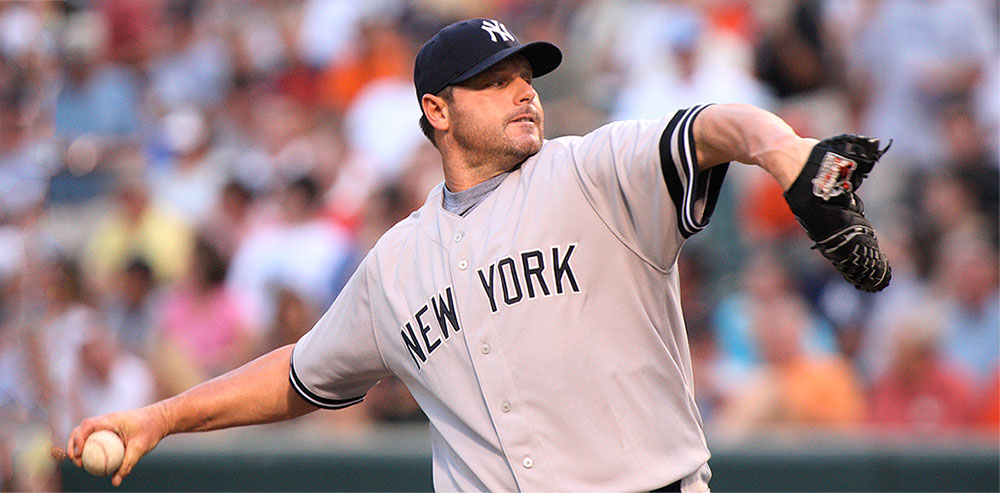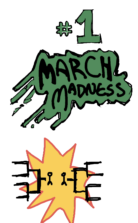

By Matt McHugh
YES. The 2013 MLB Hall of Fame class was clearly the most controversial in the history of the game—no player was a part of it. In a year that had the all-time home run leader, a seven-time Cy Young award winner, and the third player ever to have 3,000 hits and 500 home runs, none of them were elected. This year, three players were inducted.
Performance enhancing drugs (PEDs) tainted the game of baseball from the late ’80s to the mid-2000s. Many players took these illegal substances to gain an edge in the game and boost their performance. Among those players suspected of using PEDs are Barry Bonds, Roger Clemens, Mark McGwire, and Sammy Sosa. All of those players were, at one point or another, the best players in the game. Although many players were clearly using steroids, none of them were at any point suspended by the league.
So why shouldn’t these players, arguably the best in the game, be elected into the Hall of Fame? Based on their numbers alone, Bonds and Clemens are clearly first-ballot Hall-of-Famers, and McGwire and Sosa are definitely in that discussion. Yet Clemens received just 35.4 percent of the vote and Bonds received just 34.7 percent. Both of those figures are well short of the 75 percent required for entry.
The voters who chose not to vote for Bonds and Clemens primarily argued this on the basis of the character clause included in the rules for entry. It states: “Voting shall be based upon the player’s record, playing ability, integrity, sportsmanship, character and contribution to the team(s) on which the player played.”
My problem is not only how irrelevant this clause is to the Hall of Fame, but also how it has been seemingly ignored by previous generations of voters. Ty Cobb was the best player in the game during the early 20th century, but he was notorious for cheating in any way possible. He would sharpen his cleats for the sole purpose of cutting the infielder’s leg when he slid into second. There is even strong evidence to suggest that he gambled on his own games. But he is in the Hall of Fame.
Another issue I have with those who won’t vote for PED users is that during the steroid era, Major League Baseball profited tremendously. The steroid era got into full swing (no pun intended) shortly after the 1994 strike shortened the season. People came out to stadiums and watched Mark McGwire, Sammy Sosa, and Barry Bonds chase all of the records. Just a few years after baseball was losing its popularity, baseball was popular again. There is strong evidence to suggest that many people knew about the steroid issue before, but just turned the other shoulder until the drug tests came out. If PED users are kept out of the Hall, then the league has made all of that money under false pretenses.
However, some people feel like by admitting PED users, they are taking away votes from clean players that are deserving of admission. This year, that was ever-so apparent with Craig Biggio, a clean player from the steroid era who narrowly missed the 75 percent requirement. While Biggio did not make the cut this year, he still has 13 more years on the ballot, and as one of only 20 players with 3,000 career hits, he’ll get in easily during a less competitive year.
My issue with this argument is not that clean players should not get in, but that players suspected of PED use will not get in even if they are qualified. For example, Jeff Bagwell (Biggio’s former teammate) and Mike Piazza were two of the best players of the steroid era. Yet Piazza only got 62.2 percent of the votes and Bagwell had just 54.3 percent. Part of that can be attributed to the 10-vote limit per voter, but many voters passed on them because they suspected them of steroid use. Unlike Bonds and Clemens, there is no evidence that Bagwell and Piazza have ever used PEDs. They are only “suspect” because they had big forearms and played in the ’90s. The fact that voters will not vote for anyone because of suspected steroid use is absolutely insane.
Also, some voters unnecessarily worry that accepting PED users into the Hall is a method of forgiving them for their actions. However, based on the negative sentiments toward recent PED users Ryan Braun and Alex Rodriguez, it is clear that they have been permanently shamed.
I don’t have a vote for the Hall of Fame, and odds are I probably never will. But it really bothers me that the best players in the game are not given the highest honor the game has to give. It is not the job of the voters to judge a player’s character. It is their job to judge the players on their performance on the field alone. That’s what the Hall of Fame does represent and should represent: a place for the best baseball players ever.
By Spencer Walling
NO. Cheaters should never win. They should never be recognized or honored for their efforts after they’ve been caught and held accountable for playing against the rules, especially when it comes to steroid users being up for election to Major League Baseball’s Hall of Fame. In the steroid era, baseball was undergoing a stupid, cruel era of players who battled each other to hit the farthest home runs, have the fastest speed, and pump the hardest fastballs in the game.
The one problem with working toward obtaining all of these attributes was that these players had to use steroids to do so. In other words, that’s called cheating, which is why I stand firm and side with those who believe that PED users in baseball should not be elected to the Hall of Fame. In the words of Hall of Famer Hank Aaron: “The game has no place for cheaters.” In my opinion, steroid users in baseball, even if they are caught once and “clean up their act,” should never ever be in the Hall of Fame because they cheated not just the game, but the fans, their teammates, and all of the other honorable, clean players.
In order to make the Hall of Fame, a candidate has to receive at least 75 percent of the votes. With the past year, Frank Thomas, Tom Glavine, and Greg Maddux were all elected and steroid users like Barry Bonds, Roger Clemens, Mark McGwire, and Sammy Sosa finished well behind. In fact, their votes had declined from the previous year, which I applaud.
I fully support voting for clean, hardworking baseball players who achieved their feats through their talent, not the “superhuman” talent that supposedly comes from steroids. Babe Ruth managed to hit 714 home runs off hot dogs and beer. On the other hand, Barry Bonds, who lives in an era with the best nutrition, trainers, facilities, and work out regimens, bypassed all of that to take part in the most sophisticated, state-of-the-art doping plan in sports history in order to hit 48 more home runs than Ruth. So I ask you: does Bonds deserve to be remembered as one of the greatest to play the game by being put into the Hall of Fame?
The answer: absolutely not! Barry Bonds, before he took steroids, was Mr. Everything in high school, a stud in college, and an insane ballplayer in his first years in the bigs with such promise that he easily was going to become a perennial All-Star. And this was before he took steroids. He didn’t need them; he was already the best. We will never know how good he would’ve been had he been clean his whole career, and thus cannot put him into the same boat with Hank Aaron, who in my eyes is the all-time leading home run king today.
Furthermore, many voters feel that they cannot vote for anyone who had played during the steroid era, regardless if they are clean or not because we will never know for sure who doped or not. We are almost 10 years removed from the Mitchell Report claims, and more and more people have been caught each year, but those on the ballot who have been admitted to the Hall of Fame never were discussed with the use of steroids. Frank Thomas, a huge advocate for not using steroids, never had a positive test, was never claimed to have taken PEDs by his teammates or coaches, and has never been accused of taking them. So why do we have to vote against him?
I saw ESPN reporter and analyst Skip Bayless a while back acknowledge that while being a journalist in Chicago during the steroid era, he had heard countless rumors and suspicions that Chicago Cubs player Sammy Sosa was using steroids heavily. But nowhere did he hear any such things about Frank Thomas. What I’m trying to say is that by this time, we would know by now if they were cheaters. With that said, it’s preposterous to believe that cheaters—who followed the other cheaters in the game because “everyone was taking steroids” and needed this competitive advantage—should be placed in the Hall of Fame.
By being on the ballot, PED users take votes away from clean players. Nothing can prove this more than what happened this year. 3,000-hit man Craig Biggio missed the Hall of Fame this year by two votes while steroid users Sammy Sosa, Barry Bonds, Roger Clemens, Mark McGwire, and Rafael Palmeiro received a combined 529 votes. There is absolutely no doubt that if one of these users had been left off the ballot for PED use, then Craig Biggio would be up there on the podium this summer with his fellow inductees entering the Hall of Fame. But as we know, that will not be the case. With that said, it’s just a shame what the steroid era has done to baseball and how we allow it to continue to cut down those great ballplayers who played baseball with their true talents.




It wont show me the article
Hey Bobby,
Sorry about that. We have solved the issue.
Best,
Michael Herrera
Tech Editor